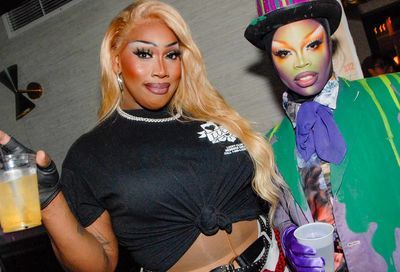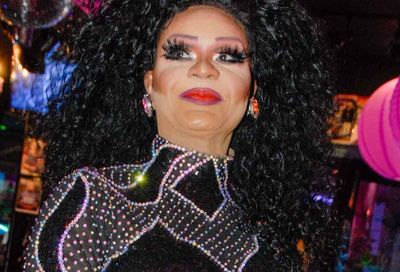Anti-Trans Dress Code Imposed by Texas Department of Agriculture
Texas Agriculture Commissioner dictates employees must dress "in a manner consistent with their biological gender" under new rigid policy.

Texas Agriculture Commissioner Sid Miller is requiring agency employees to dress “in a manner consistent with their biological gender,” in a swipe against the transgender and gender-nonconforming community.
Miller issued the requirement on April 13 as part of a “dress code and grooming policy,” issued as a memo to department employees.
According to The Texas Observer, which first reported on the new dress code, employees are expected to dress in a way that their clothing and standards of grooming conform to their assigned sex at birth, as determined by their biological anatomy.
“Basic elements for appropriate attire across the board consist of clothing that is in neat and clean condition,” the dress code reads.
The code sets standards and provides examples of clothing that conforms to “business attire” and “business casual” attire.
“For men, business attire includes a long-sleeved dress shirt, tie, and sport coat worn with trousers and dress shoes or boots. For women, business attire includes tailored pantsuits, businesslike dresses, coordinated dressy separates worn with or without a blazer, and conservative, closed-toe shoes or boots,” the memo reads.
The code defines “Western attire” — such as cowboy hats or boots — in the “business casual” category.
“The following are some examples of business casual attire: Shirts with collars, business casual crewneck or V-neck shirts, blouses, and golf and polo shirts. Examples of inappropriate shirts include T-shirts, shirts with inappropriate slogans, tank tops, muscle shirts, camouflage, and crop tops. Pants: Casual slacks and trousers and jeans without holes, frays, etc. Examples of inappropriate pants include shorts, camouflage, and baggy or sagging pants or pants worn below the waist or hip line. Footwear: Casual slip-on or tie shoes, Western boots, and clean athletic shoes. Examples of inappropriate footwear include flip-flops, slippers, slides and crocs,” the memo reads.
Exceptions to the dress code include those who have to wear special uniforms or protective clothing for their jobs, such as labor-intensive work or fieldwork. The dress code also discourages clothing that is too tight or revealing, clothing with rips, tears, or frays, “unnatural neon or fluorescent hair colors,” and facial piercings of any type besides ear piercings.
“This dress code and grooming policy applies to all employees of [the Texas Department of Agriculture], including interns and contract employees who will be working on TDA premises or interacting with others on behalf of TDA. Divisions may institute dress codes for their respective areas but may not authorize violation of the minimum standards established by this agency policy,” the memo, signed by Miller, reads.
“Any staff member who does not meet the attire or grooming standards set by TDA will be subject to corrective action and may be asked to leave the premises to change their clothing. Staff members will not be compensated for any work time missed because of failure to comply with designated workplace attire and grooming standards,” the memo continues. “If problems with an employee persist, supervisors should follow the normal disciplinary process. Violation of this agency policy includes remedies up to and including termination.”
Critics say that, although it does not expressly mention the transgender community, the it is intended to take a swipe at gender-nonconforming individuals who present in a way that does not match their assigned sex at birth.
Brian Klosterboer, an attorney with the American Civil Liberties Union of Texas, told The Texas Tribune that the dress code likely violates Title VII, which bans employment discrimination based on sexual orientation or gender identity, as well as the First Amendment’s right to free expression and the Equal Protection Clause of the Fourteenth Amendment.
“State agencies should be focused on doing their jobs and not discriminating against their own employees and trying to make political statements through their agency regulations,” Klosterboer said. “There is no important governmental interest that this can meet.”
The new dress code drops amid a host of anti-LGBTQ legislation or executive orders being pushed by legislators and state agencies in the Lone Star State.
Last year, Republican Gov. Greg Abbott issued an order directing state child welfare agencies to investigate families with transgender and gender-nonconforming children, whom investigators believe may have received gender-affirming care to assist them in transitioning, for “child abuse.”
More recently, the Republican-led Senate passed two bills that seek to restrict drag performances in public where children might view them.
Ricardo Martinez, the CEO of LGBTQ advocacy group Equality Texas, said that the dress code, for all its specific examples, is vague about what constitutes gender-nonconforming clothing or hairstyles.
He argues that the intent of the proposed policy is to enforce rigid gender stereotypes. For example, a man — regardless of sexual orientation — who has long hair or who wears jewelry could technically be flagged under the dress code.
So, too, could a woman who has short cropped hair or dresses more stereotypically “masculine,” such as wearing a suit and tie as opposed to a pantsuit.
“While this policy was clearly designed to target transgender employees, it will have a negative impact on everyone,” Martinez said. “Any policy that is designed to target a specific group degrades the whole department. Texans deserve better.”
Support Metro Weekly’s Journalism
These are challenging times for news organizations. And yet it’s crucial we stay active and provide vital resources and information to both our local readers and the world. So won’t you please take a moment and consider supporting Metro Weekly with a membership? For as little as $5 a month, you can help ensure Metro Weekly magazine and MetroWeekly.com remain free, viable resources as we provide the best, most diverse, culturally-resonant LGBTQ coverage in both the D.C. region and around the world. Memberships come with exclusive perks and discounts, your own personal digital delivery of each week’s magazine (and an archive), access to our Member's Lounge when it launches this fall, and exclusive members-only items like Metro Weekly Membership Mugs and Tote Bags! Check out all our membership levels here and please join us today!

























